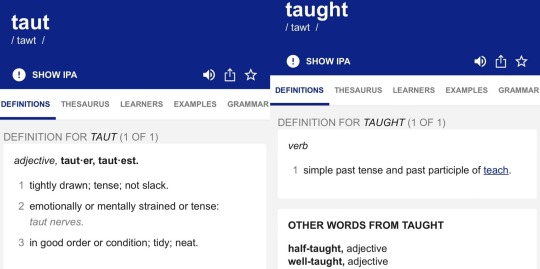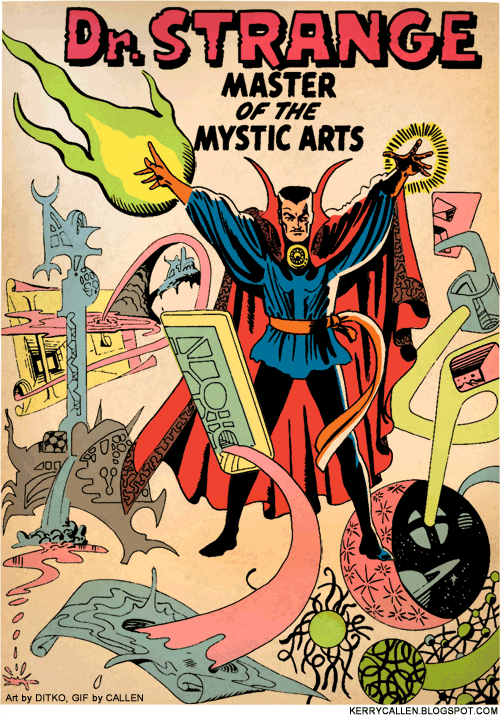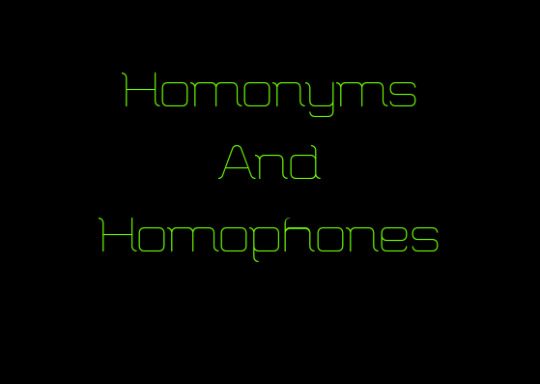#...homonyms. not homophones
Text
apparently I'm becoming an impromptu grammar teacher, but while I have another post brewing about subject-verb agreement that I'm trying to bully into being more coherent than anything my grammar teachers taught me, have another instance of "Attack of the Homophones" that I myself fell victim to and when I realized it I had to go lie down:
Censor is to obscure or remove things. You may know this one from beeps on the TV when someone says a word not allowed by local programming, or new age internet Puritans claiming it's what's needed to protect metaphorical children they don't actually know or care about as a thin veneer to the belief that all media must be pure according to an arbitrary standard of morals that aren't actually universal or even helpful.
Sensor is a device which senses, like the thing in your car that senses when the key is inside of it and attempting to get the engine to turn over so the car will start but it stops working all of a sudden, probably related to sudden bitterly cold weather, and sends you into a tizzy for several days until the mechanic sorts it out and you realize you've been typing the wrong word in texts to your family the entire time.
#writing advice with quilly#attack of the homophones#ugh now i gotta go back and tag the rest of the posts in this series i did not mean to make#sure hope mass post editor is still there#took a while to find last time#...homonyms. not homophones#good lord gravy almighty here comes another post#attack of the homonyms
13 notes
·
View notes
Text
I heard someone call fake hippies with rich parents "Trustafarians" and I haven't been the same since
#fixed a typo#usually im very good with homophones but i had to spell czech Rastafarianism to make sure i got the portmanteau spelled right and it threw#me off my usual game#homonym* I feel like a failure. and i love linguistics#if was actually a nerd id study etymology
124 notes
·
View notes
Text
Bestie fic writers, it’s time for another edition of Helpful Homophone Hint from your friendly neighborhood beta!
If you’re pulling on/straining something — a string, tension, a Force bond, etc. — you’re pulling it taut.
If you once learned something from a teacher, you were taught.

I naturally have an eye for these kinds of homonym mixups, so it’s okay if you don’t! Let me beta read your fic and I’ll catch all these for you. 😃 It’s my way of giving back, for all the hours of enjoyment fanfic has given me!
(As always, fic writers, thank you for sharing your work with the world!! I appreciate you!)
#fic writers#ao3 writer#let me edit your fic!!#beta helpful hint#friendly neighborhood beta#helpful homophone hint#ao3#ao3fic#ao3 fanfic#fanfic#fanfiction#beta editor#editor#editing#homonyms#homophones#beta reader#born to beta
22 notes
·
View notes
Text
i am begging everyone, please learn the difference between "generally" and "genuinely"
4 notes
·
View notes
Text
2024 APRIL POEM-A-DAY CHALLENGE: DAY 25
Today's prompt: write a homonym poem.
A homonym is either (or both)
a homograph (word spelled the same with different meanings and possibly different pronunciations) or
a homophone (word that is pronounced the same but has different spellings).
Here are some examples of homophones and homographs to get you started:
20 Homophones Examples for Writers.
30 Homographs Examples for Writers.
Remember: These prompts are springboards to creativity. Use them to expand your possibilities, not limit them.
#poetic asides#poetry prompts#poem-a-day#robert lee brewer#2024 april poem a day#Day 25#homonym#homograph#homophone
1 note
·
View note
Text
"By the Whore-y Hosts of Hoggoth!" hits a little bit different.

0 notes
Link
0 notes
Text
Do you consider “formerly” and “formally” homophones? Because they’re both pronounced “formily”?
0 notes
Text
Does "sing" in past tense = "sang" because "singed" is already a word?
#answer: probably not#english delights in homonyms and homophones#but i was writing the word singed out and had a moment's doubt about whether i was spelling it correctly#for obvious reasons#rambles
1 note
·
View note
Text
Homonyms and Homophones
Homonyms and Homophones - and explanation
#amwriting #writingcommunity #homonyms #homophones #English #language #words #WriterCommunity
In the English language, Homonyms – are words that sound the same and are spelt the same but have different meanings.
And
Homophones – are words that sound alike but are spelt differently and have different meanings.
Here are some examples of homonyms and homophones and their definitions.
Homonyms
Rose – this can mean ‘to have just gotten up’ and it is also ‘the name of a type of…

View On WordPress
0 notes
Text
Please tell me:
one hyper specific issue you have with English (or your parent/target language): grammar/spelling/punctuation/homophones/homonyms/etc that you are hopeless in
and one thing you’re great at that you know other people struggle with.
Mine are:
I’m absolutely incapable of identifying when I should use affect/effect and it’s related forms, to the point I will reword the sentence either in an work email or my novel to avoid having to use affect/effect.
But I am very good at picking out when to use who or whom, and my evil autistic ass loves correcting coworkers to say ‘whom’ and make characters do it in my book, despite the fact in both common speech and formal writing, whom is largely abandoned and so this skill is completely worthless, especially considering people do still care about affect/effect in formal writing (even if some people won’t notice).
#language#grammar#reblog bait#basically lmfao#but I am genuinely curious#langblr#English language#homophones#homonyms
1 note
·
View note
Text
I’ve been seeing way more typos in fanfic recently, like really strange ones, that I can only conclude are the work of AI based spellcheck options (and in some cases, creative phonetic spellings I really hope are human error bc beautiful).
However, there is one pedantic little quibble that I can present for the next Attack of the Homonyms, and it’s this:
Grisly is an adjective that means horrific or gruesome.
Grizzly means a kind of large North American bear (or, as in grizzled, means grey-haired).
It was not a grizzly murder scene, but it could be a grisly grizzled grizzly bear murder scene.
#writing advice with quilly#attack of the homonyms#attack of the homophones#pretty sure this one is just a homonym tho#I’m back and more petty than ever folks
10 notes
·
View notes
Link
https://en.wikipedia.org/wiki/Category:Sikh_warriors
Kartar Singh Taunque
Nanu Singh Saini
Sangat Singh Saini
Uday Singh Taunque
0 notes
Text
Homonyms and Homophones
Homonyms and Homophones
#Homonyms and Homophones#vocabulary#https://www.vocabularyworkshopanswers.com/#https://www.elafree.com/#https://www.quizurenglish.com/#learn_english
0 notes
Text
The curse of homophones and homonyms in audiobooks: the sentence I heard in the middle of a make out scene - "read through a handout." The actual sentence - "Red threw a hand out." Red is the dude's nickname, obvs.
I told my sister and she replied "Haha! Right??? I never forget a moment in a book I once read... "her pants were edged with sobs". Like... how did you put Sobs on the edge of your trousers???"
237 notes
·
View notes
Note
Would you call two characters synonyms if they shared like, a basic pronunciation but different intonation e.g. 契 and 起 or is that exclusively for if they share the exact pronunciation (like 出 and 初)?
synonyms are when words mean the same thing
You could call 出/初 homophones (or homonyms).
In Chinese, 出/初 (same sound, same tone) would be considered homophones (同音字; "same syllable words").
契/起 (same sound, different tones) would be considered 近音字 ("approximate/close syllable words").
I think if you tried to apply 近音字 to English it would just be like beach/bitch, pin/pen, father/farther, cot/caught, (etc), where the words are spelled different, mean different things, but sound similar (though perhaps not the same, in most accents).
In languages with the Latin alphabet, homonyms are words that are spelled the same but mean different things whereas homophones are words that sound the same but aren't spelled the same and mean different things; since Chinese is a language based on characters, there are no true homonyms, although I think some translation dictionaries still use the word instead of homophone, which is why I bring it up at all.
105 notes
·
View notes